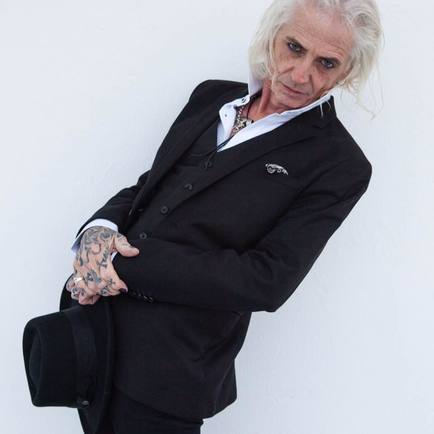LEDFOOT a.k.a.
TIM SCOTT McCONNELL
“The Master of Gothic Blues”
TIM SCOTT McCONNELL
“The Master of Gothic Blues”
|
Interview by Patrizia Beatini
Italian version >>> I saw him on internet randomly one night, while I was looking through for something that could interest me.
Suddenly, I was hit with a beautiful black and white video from some years ago, with a white-haired man in dark clothes and covered with tattoos and silver jewelry. |
 Photo ©Toshimi Ogasawara Photo ©Toshimi Ogasawara
He had a Gothic look and was playing an acustic guitar while singing on the Seine river. I loved his sound immediately and the power of his lyrics, their simplicity and directness; I liked how he expressed himself and the contrast of the beauty of his surroundings with the grit and gravel of his voice. Because I have never believed in coincidences, I decided to find out more about him. His name is Timothy (Tim) Scott McConnell, born in Florida in 1958. He began playing music very early in life, then he transferred to New York and in 1979, he became a member of the band, The Rockats. Between 1983 and 1987, he signed his first contract with Sirene Records, recording the song Swear, made famous by Sheena Easton. He also put out High Lonesome Sounds with Geffen Records. But in 1989, he created the more well-known band, The Havalinas, together with Smutty Smith and Chalo Quitana, producing two albums, one of them live and signing with Elektra.
After leaving The Havalinas, McConnell produced several albums on his own, and went on tour in America, supporting the concerts of Bob Dylan, Chris Isaak and Tina Turner. He also toured three times in Europe during that period. In 1993, Tim moved to Norway and with Warner Music the following year, he published the album Deceivers and Believers, for which he won an award. In 1996, he was honored by Bruce Spreengsteen who introduced in his album the cover song High Hopes by McConnell and made it famous. But it was only after 13.songs, his soloist album, that Tim Scott McConnell decided to evolve as a guitarist and he called his new project, Ledfoot. Between 2004 and 2007, with Ledfoot he created a new style of music, “Gothic Blues.” He plays the acoustic guitar with 12-strings mostly in B minor, tuning with porcelain slide and steel finger picks, which help to give the sound a profound and unusual impression, and frequently adding some extra rhythm with his stomp box. The artist’s repertoire consists solely of self-written songs; most of which are autobiographical. He moves with almost theatrical gestures and sings with a strong and confident voice, creating at times an intense and dramatic sensuality. The melody is dark blues and the lyrics describe important themes of daily life, such as love, suffering, worries; it is like he is always walking close to hell. From 2007 to 2011, Ledfoot recorded three albums: Devil’s Songbook, Damned, and Gothic Blues, in which there is one of his most famous songs, Mean to me. After I discovered the versatility and great charisma of this artist, I felt the need to contact and interview him. P.B: Hi Tim and thank you for your great willingness to speak with us. In this introduction, I spoke only briefly about your life, in order for us to hear more from you yourself. Is there anything else about your life or career that you would like to share, or an album that is more important to you that you would like to mention? TSM: I guess being a very private person by nature and life’s lessons, I tend to keep my mouth shut when not on stage. I was born in a trailer park and went to over twenty schools growing up that teaches a kid to keep his mouth shut. I usually let my songs do the talking P.B: Speaking of Ledfoot, your new music style “Gothic Blues” and the creation of your persona are very interesting. How did you come up with this idea and how much of your true personality is in it? TSM: It was a natural evolution, I guess my goal as an artist was to create a place distinctly mine it is very much who I am. I’m not good at pretending, so what you see is what you get. I created gothic blues because I felt so much blues these days misses the original intention , which was to expose the worry in your heart and call the devil down we have modern problems, angst, stress, mental and emotional overload this is what I sing about. P.B.: It seems you make your guitar suffer when you play with your steel finger picks and break its strings. So, can you give us your definition of suffering and how much you believe it is relevant to your creativity? TSM: I never think about it. I just live my life like anyone else I never analyze my life or music that way. That would take an objective point of view that’s impossible for me to have. But yes, my guitars do suffer we have a love-hate relationship... P.B.: Your lyrics are almost always autobiographical, for example, in Wicked State of Mind, you speak of a dark and evil side of your mind. What are you referring to exactly and what is for you, the darkness? Is it an insanity in society or a personal discomfort? TSM: Again, I don’t analyze things that way...I don’t think any artist is capable of stepping outside their self that way. You just write what you feel. It’s up to the individual listeners to decide what a song’s about...I just write them. P.B.: It is difficult to not ask repetitive questions that are in interviews with artists of your caliber. I know that you enjoy a certain popularity in America and Norway. In the past, you have toured several times in Europe. Have you ever been to Italy and if not, would you like to do a live performance in Italy? TSM: Yes, I’d love to visit Italy and do some shows; one day I hope to visit. P.B.: Is there an artist who inspires you or who particularly interests you? Where does your inspiration come from? TSM: I grew up in the southern states in America. I’m Cherokee/Irish. I grew up listening to country, folk and blues the first songs I learned were from Johnny Cash, guess that’s how I ended up in black. P.B.: In most of your songs, we can always feel a great pain when you sing about love. Can you tell us how much does the word love mean to you in your life? TSM: The word love is basically inadequate considering the breadth of emotion it’s supposed to cover I guess I am not a very big fan of that word. The fact that the same word can be used for your child or your favorite ice cream is simply absurd. P.B: Tim, during your career as a musician, you have signed contracts with many recording companies: how much has your relationship with them influenced your musical creativity and how you perform? TSM: In the past they were much more controlling, they had a lot of power then and were the only way to get your music out. Now, with record stores pretty much nonexistent, they wield much less power not to mention at this point, I am what I am...that’s pretty much impossible for anyone to change, much less a record company, but with the right company, you collaborate to make the best product possible.. just like any healthy partnership. P.B.: What do you think about the online musical revolution? To those newly interested in your music, would you like to tell them where best to find your albums? TSM: You can find me on iTunes and YouTube. I’m hoping to release the next record also on vinyl. P.B.: It must have been meaningful to you to collaborate with Bruce Spreengsteen for the song High Hopes, that you wrote with The Havalinas in 1990 while thinking of America. Share with us a little about that, if you want. And today, what are the high hopes of Tim McConnell? TSM: I only met Bruce once, we sat and talked about music for a couple hours. He mentioned he liked high hopes but I had no idea he would record and release it. I was actually unaware he had until Rolling Stone contacted me for an interview. (Smiling) do I have high hopes? That’s an interesting question. P.B.: Last question, Tim. Are you working on something new? TSM: Yes, I’ve recorded about thirty new tracks...just looking around for the best way to release them. P.B.: Thank you Tim for letting us interview you today and having given us a little bit of your precious time. We hope to see you soon here in Italy. Ciao. TSM: Thank you Patrizia, Yes, I hope to visit soon. Ciao. Patrizia Beatini
Scrivono in PASSPARnous:
Bruno Benvenuto, Ubaldo Fadini, Tiziana Villani, Claudia Landolfi, Alfonso Amendola, Mario Tirino, Vincenzo Del Gaudio, Alessandra Di Matteo, Paulo Fernando Lévano, Enrico Pastore, Francesco Demitry, Sara Maddalena, Alessandro Rizzo, Gianluigi Mangiapane, Nicola Lonzi, Marco Bachini, Daniel Montigiani, Viviana Vacca, Fabio Treppiedi, Daniele Vergni, Mariella Soldo, Martina Lo Conte, Fabiana Lupo, Roberto Zanata, Bruno Maderna, Silvia Migliaccio, Alessio Mida, Natalia Anzalone, Miso Rasic, Mohamed Khayat, Pietro Camarda, Tommaso Dati, Enrico Ratti, Ilaria Palomba, Davide Faraon, Martina Tempestini, Fabio Milazzo, Rosella Corda, Stefania Trotta, Manuel Fantoni, Marco Fioramanti, Matteo Aurelio, Giuseppe Bonaccorso, Rossana De Masi, Massimo Maria Auciello, Maria Chirico, Ambra Benvenuto, Valentina Volpi, Massimo Acciai, Gianluca de Fazio, Marco Maurizi, Daniele Guasco, Carmen Guarino, Claudio Kulesko, Fabrizio Cirillo, Francesca Izzi, Antonio Mastrogiacomo, Giulia Vencato, Alessandro Baito, Margherita Landi, Mirjana Nardelli, Patrizia Beatini, Nicola Candreva, Manlio Palmieri, Stefano Oricchio, Francesco Panizzo. |
Intervista
a Valeria Cimò di Roberto Zanata WORMHOLES
Una performance audio-visiva di Roberto Zanata Processing
di Roberto Zanata |
|
PASSPARnous:
|
Torna alla Home
|
|
|
Vuoi diventare pubblicista presso la nostra rivista?
sottoscrivi il bando. Accedi al link dall’immagine sottostante.
sottoscrivi il bando. Accedi al link dall’immagine sottostante.
Psychodream Theater - © 2012 Tutti i
diritti riservati




